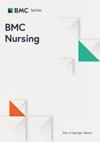Latent profile analysis of empathy ability and its relationship with professional quality of life among hospice nurses in China
IF 3.1
2区 医学
Q1 NURSING
引用次数: 0
Abstract
Empathy is important in hospice nursing clinics and may influence nurses’ professional quality of life (ProQOL). However, present studies ignoring each empathic dimension, and few researches have explored the correlation between empathy and ProQOL in hospice nurses in Asia. To better understand hospice nurses’ empathy abilities in China and its relationship with ProQOL, the aim of this study was to identify the latent profiles and its influencing factors of hospice nurses’ empathy ability, as well as differences in ProQOL across each latent profile. A cross-sectional study was conducted from October 2021 to September 2022, and a total of 725 hospice nurses were recruited from different geographic regions in China. Participants completed the Empathy Ability Scale for Hospice Nurses and the Brief Professional Quality of Life Scale. Latent profile analysis (LPA) was employed to identify latent profiles of empathy ability among hospice nurses in China. The predictors of hospice nurses’ empathy ability in different latent profiles were assessed using multinomial logistic regression analysis. One-way ANOVA test and the Kruskal–Wallis test were used to compare the ProQOL scores in each latent profile of nurses’ empathy ability. This study identified three latent profiles of hospice nurses’ empathy ability, and those profiles labelled “poor empathy ability-high surface empathy expression” (n = 216, 29.8%), “moderate empathy ability” (n = 359, 49.5%) and “high empathy ability-high deep empathy expression” (n = 150, 20.7%). Multinomial logistic regression analysis suggested that age, hospital level, whether income meets expectations, interests in hospice care work, hospice work experience, and receiving psychological counselling were predictors of hospice nurses’ profile membership of empathy ability. The scores of compassion satisfaction (CS) and burnout (BO) in ProQOL were significantly different across each profile (P < 0.001), while scores of secondary traumatic stress (STS) in ProQOL were not different across each profile (P = 0.294). Hospice nurses’ empathy ability was divided into three latent profiles, and enhancing empathy ability may be conducive to improving hospice nurses’ CS, while reducing BO, thus fostering their overall quality of life. Nursing managers should identify hospice nurses at higher risk of BO and implement targeted interventions focused on enhancing nurse’s empathy abilities.中国临终关怀护士移情能力及其与职业生活质量关系的潜特征分析
移情在安宁疗护诊所中非常重要,可能会影响护士的职业生活质量(ProQOL)。然而,目前的研究忽视了移情的各个维度,很少有研究探讨亚洲安宁疗护护士的移情能力与 ProQOL 之间的相关性。为了更好地了解中国临终关怀护士的移情能力及其与 ProQOL 的关系,本研究旨在识别临终关怀护士移情能力的潜在特征及其影响因素,以及不同潜在特征下 ProQOL 的差异。本研究于 2021 年 10 月至 2022 年 9 月进行了一项横断面研究,共招募了 725 名来自中国不同地区的临终关怀护士。参与者填写了安宁疗护护士移情能力量表和简明职业生活质量量表。采用潜在特征分析(LPA)确定了中国安宁疗护护士移情能力的潜在特征。采用多项式逻辑回归分析评估了不同潜特征中安宁疗护护士移情能力的预测因素。采用单因素方差分析和Kruskal-Wallis检验来比较护士移情能力各潜质图谱的ProQOL得分。本研究确定了安宁疗护护士移情能力的三个潜在特征,分别为 "移情能力差-高表面移情表达"(n = 216,29.8%)、"移情能力中等"(n = 359,49.5%)和 "移情能力高-高深层移情表达"(n = 150,20.7%)。多叉逻辑回归分析表明,年龄、医院级别、收入是否符合预期、对临终关怀工作的兴趣、临终关怀工作经验和接受心理咨询是临终关怀护士移情能力档案成员的预测因素。在 ProQOL 中,同情满意度(CS)和职业倦怠(BO)的得分在各特征之间存在显著差异(P < 0.001),而在 ProQOL 中,继发性创伤压力(STS)的得分在各特征之间没有差异(P = 0.294)。安宁疗护护士的移情能力分为三个潜在特征,提高移情能力可能有利于改善安宁疗护护士的CS,同时减少BO,从而提高其整体生活质量。护理管理者应识别出较高BO风险的安宁疗护护士,并实施有针对性的干预措施,重点提高护士的移情能力。
本文章由计算机程序翻译,如有差异,请以英文原文为准。
求助全文
约1分钟内获得全文
求助全文
来源期刊

BMC Nursing
Nursing-General Nursing
CiteScore
3.90
自引率
6.20%
发文量
317
审稿时长
30 weeks
期刊介绍:
BMC Nursing is an open access, peer-reviewed journal that considers articles on all aspects of nursing research, training, education and practice.
 求助内容:
求助内容: 应助结果提醒方式:
应助结果提醒方式:


